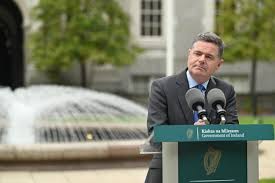Centralised Procurement Arrangements: Minister Donohoe’s Plans
 Paschal Donohoe TD, the Minister for Public Expenditure, NDP Delivery and Reform, presented a Memorandum for Government to the Cabinet. This memorandum laid out plans to fortify the use of centralised procurement methods within Ireland’s civil and public service. These proposed changes aim to streamline the procurement process, make it more efficient, and align it closely with the government’s environmental and social policy objectives.
Paschal Donohoe TD, the Minister for Public Expenditure, NDP Delivery and Reform, presented a Memorandum for Government to the Cabinet. This memorandum laid out plans to fortify the use of centralised procurement methods within Ireland’s civil and public service. These proposed changes aim to streamline the procurement process, make it more efficient, and align it closely with the government’s environmental and social policy objectives.
Originating from a procurement reform programme established a decade ago in 2013, the Office of Government Procurement (OGP), the Education Procurement Service (EPS)and other sectoral procurement bodies in Health, Defence, and Local Government have already set up 150 central buying arrangements across 16 primary categories of expenditure. These arrangements serve multiple purposes. They consolidate the buying power of the state, thus leading to more value for money. They also reduce repetitive work both for public service bodies and suppliers and allow for the integration of green and social criteria into public procurement processes.
Moreover, the reforms throughout the lifetime of the programme have enhanced green and social policy implementation, provided greater access for Small and Medium Enterprises (SMEs) to government contracts, and supported the National Development Plan (NDP) through construction procurement reforms. These reforms were also backed by the Commercial Skills Academy, further lending credibility and skill to the overall programme.
One of the cornerstone elements of this initiative is the forthcoming Circular, set to be published in early 2024. This Circular will guide all public bodies in adhering to the government’s procurement policy regarding the use of centralised procurement arrangements. The focus here is not merely on efficiency but also on making Green Public Procurement a routine part of the procurement process.
Minister Donohoe emphasised that these centralised arrangements align well with public service needs and market capabilities. The arrangements are also a significant part of the government’s policy. He highlighted that nearly €18.5 billion, which equates to nearly one in every five euros spent in the Irish economy, is utilised for public procurement. Thus, these measures have far-reaching economic implications, necessitating co-ordinated effort across the public service.
Ossian Smyth TD, the Minister of State responsible for Public Procurement, welcomed these initiatives. He stressed the importance of adhering to this reform agenda within each sector, acknowledging that central procurement arrangements offer value-for-money and transparency, while also supporting the government’s broader green and social objectives.
The Department of Public Expenditure, NDP Delivery and Reform, will develop a Circular in the upcoming months.
Key achievements over the programme’s ten-year span include the foundation of supportive structures like the Interim Procurement Reform Board, the Procurement Executive, Category Councils, and the Strategic Procurement Advisory Group. In addition, the programme has seen advancements in data collection and reporting mechanisms, thus enhancing transparency, and has engaged public service bodies through various mediums including conferences, seminars, newsletters, and a dedicated website.
The work of the EPS, the OGP and all its sectoral partners have been instrumental in creating a holistic suite of central buying arrangements that not only offer financial efficiency but also contribute to the government’s sustainability and social inclusion goals.
Read More
- https://merrionstreet.ie/en/news-room/news/minister_donohoe_announces_plans_to_increase_use_of_centralised_procurement_arrangements.176190.shortcut.html
- https://paschaldonohoe.ie/latest-news/
